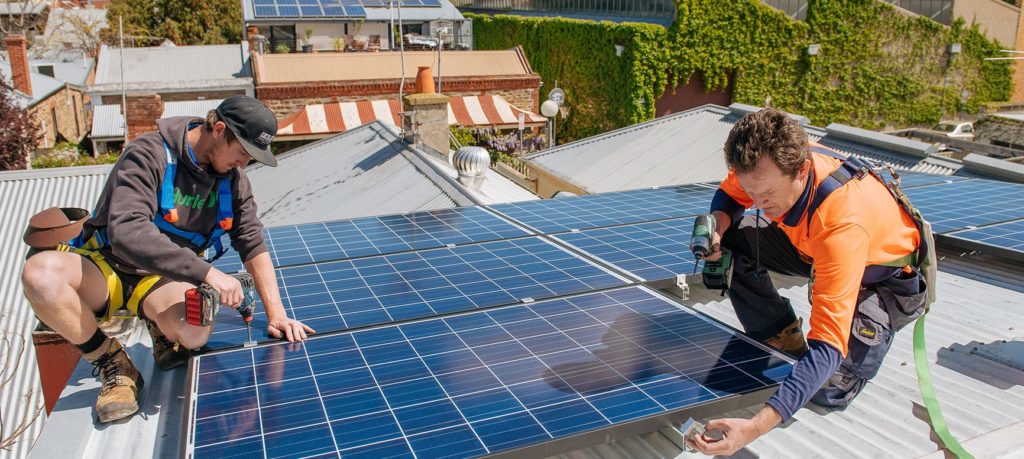The City of Adelaide’s Sustainability Incentive Scheme is supporting businesses and households to reduce their carbon emissions by embracing energy efficiency, sustainable transport and renewable energy.
This case study explores how wide scale emissions reductions can be achieved when local governments take initiative on climate change.

Why Adelaide is tackling community emissions
Addressing community emissions is a difficult area for local governments to tackle, and barriers remain for community uptake of sustainable technologies.
The City of Adelaide has an ambition to transition to a low carbon and circular economy and support the community through education and incentives.
Council is meeting the challenge head on with its Sustainability Incentive Scheme (SIS), just one part of their bold plan to move the community toward carbon neutrality as quickly as possible. The scheme seeks to remove some of the financial barriers to uptake of leading edge, sustainable technologies.
How is the City of Adelaide taking its community to carbon neutral?
SIS is one of the actions in the Carbon Neutral Action Plan 2016-2021, which set the ambition for the city as a whole to progress towards carbon neutrality.
The scheme offers financial incentives to households and businesses to adopt sustainable technologies like solar systems, energy storage systems, LED upgrades, energy monitoring systems, EV chargers, apartment upgrades, rainwater tanks, building ratings, and carbon neutral certifications.
The City of Adelaide has also adapted the program over its lifetime, to keep it at the forefront of sustainable technology. Council led with the first energy storage system rebate in Australia, which supported over 100 systems, and this approach was then taken up by the South Australian government who launched the successful Home Battery Scheme. In 2019, Adelaide discontinued the solar rebates for households due to the rapid price drops and faster payback time. Other changes to the scheme in 2019 included introducing new rebates for shared solar for multi-storey commercial and residential buildings, rebates for bi-directional EV charging, and to cover some costs of NABERS ratings and carbon neutral certifications.
Outcomes of Adelaide’s Sustainability Incentive Scheme
Environmental
Based on the state average for CO2 emissions from the grid, solar panel installations via the scheme can be expected to avoid over 2,185 tonnes CO2 per year and produce electricity equivalent to 1,514 average 3-person homes in South Australia! This does not account for additional battery storage, or efficiency upgrades in houses and apartments.
Economic
As of September 2021, the scheme has:
- provided over $1.4 million dollars of rebates, leveraging a further $11 million of investment sustainable technologies
- supported over 630 projects by businesses and households (around 74% of recipients are residents)
The scheme is supporting market trends important for Adelaide’s transition to a low-carbon future. The number of business tenants who pay to install solar on their landlord’s property is growing – paybacks are favourable within the terms of a five-year lease. In 2021, Council has seen the number of EV charger applications start to increase.
Corporate and community
Greenhouse gas emissions reductions are occurring in the community. The total savings estimated for the solar installations alone represents an additional 15% of carbon emissions that Council was directly responsible for through operations in 2019-2020.
The projects undertaken by householders and business up to the end of 2021 were:
- 364 solar systems, providing 5.2 MW of capacity
- 113 energy storage systems
- 84 LED upgrades
- 58 Energy monitoring systems
- 14 EV chargers
- 11 apartment upgrades
- 10 hot water systems
- 5 rainwater tanks
- 3 building ratings
- 4 carbon neutral certifications
For community members, the tangible benefits of installing sustainable technologies via SIS are reducing the upfront cost of their projects, providing relief from utility bills, and more comfortable indoor environments. SIS also supports Adelaide’s ambition to be the ‘most liveable city in the world.’
Energy generation
Since 2015 the scheme has contributed to 364 solar systems, providing 5.2 MW of capacity to the grid, or an estimated 8,110 MWh per year. The first “shared solar” installation for an apartment building was installed in the CBD in 2021, providing a way for apartment dwellers to gain the benefits of rooftop solar through ‘behind the meter’ technology.
After becoming certified carbon neutral in FY 2019/2020, the City of Adelaide is actively supporting the community in continuing the journey towards a more sustainable future.
The City of Adelaide was a winner in the Community Engagement Achievement category in the Cities Power Partnership Climate Awards 2021.
For more information about this project or other case studies on our website, please contact us at [email protected].



